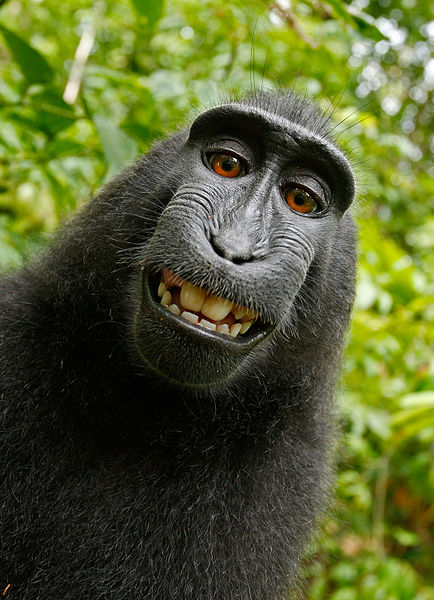Overview
Previously, we reported on a (fabulous) selfie taken by Naruto, a seven-year-old crested macaque monkey. Readers may recall that David Slater, a famous wildlife photographer, deliberately left his camera where a troop of crested macaques might pick it up and use it. He was right, and Mr. Slater put some of the best photos on his website. That’s when things became more complicated and litigious.
As background, the owner of a copyright can, among other things, prevent others from reproducing the copyright material without authorization. Copyright in a photograph arises automatically in the author of the photo (the photographer) when the photo is taken.
Mr. Slater said that he was the author and copyright owner of the selfie because he adjusted the camera settings and placed the camera intending that the crested macaques would pick it up and click the shutter button. Wikicommons, an online repository of free-use images, took the photo from Mr. Slater’s website and made it available to all. Wikicommons said that it had the right to do so because Naruto was the author of the photo and only humans can be copyright authors. The U.S. Copyright Office weighed in as well, agreeing that a photograph taken by a monkey is not eligible for copyright protection and pronouncing “the Office will not register works produced by nature, animals, or plants… [or] a work purportedly created by divine or supernatural beings.”
That’s when the dispute took yet another turn. People for the Ethical Treatment of Animals (PETA) sued on behalf of Naruto, asking a California district court to overrule the Copyright Office and declare that Naruto was the author and owner of the copyright. That would have given a biologist working with Naruto the right to license the images and use the proceeds to benefit the endangered crested macaques.
PETA argued that Naruto was the author because the selfie “resulted from a series of purposeful and voluntary actions by Naruto.” The district court did not see the merits of this argument and held that, not being human, Naruto could not be an author under U.S. copyright law. PETA appealed this decision but, before the appeals court ruled, a settlement was reached that will funnel 25% of future revenue to charities that protect the habitat of Naruto and other crested macaques in Indonesia.
End of story? Yes, and no. At least for the time being, animals cannot be “authors” under U.S. copyright law – even exceptionally intelligent monkeys with individual personalities acting with intention.
But what about other non-human brains? Artificial intelligence (AI) has reached the point where computer brains are creating new Rembrandts, writing poetry, and composing music. Who is the “author” of these works and who (if anyone) owns copyright in the next AI Rembrandt, Dickinson or Mozart? The answer may hinge on Naruto, sitting on her Indonesian island with her troop of crested macaques and her effervescent grin.